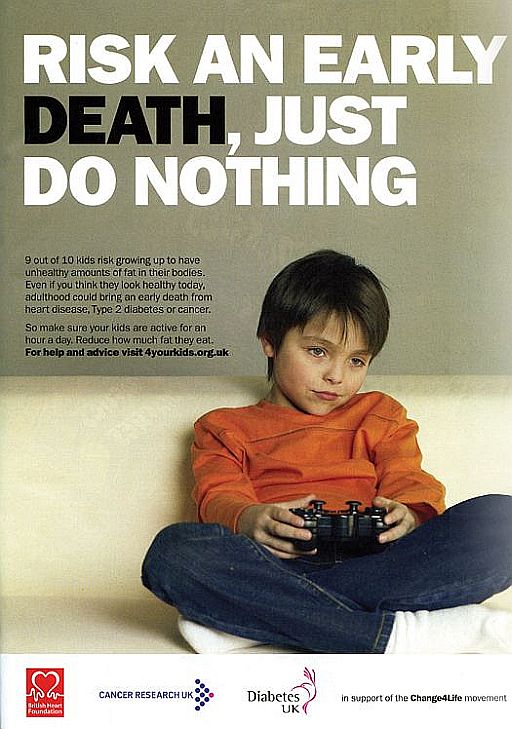
I have written many times on here about the current inept, execrable British labour government. One feature of socialists is that they think that they know better than the public who voted them into power. And this know all attitude manifests itself in control freakery. The current labour government have stripped away our rights and freedoms more than any previous British government. They now have more oppressive powers against the electorate than in any other democracy.

This nanny state mentality manifests itself in many ways. And one of these is in spending huge amounts (£275 million) telling us that being overweight is bad for us. Something we obviously need to be told. Their Change4Life campaign is costing a lot of our money and has met much criticism. That it is simplistic, has unsuitable partners such as Nestle, PepsiCo and Mars and that it simply won’t work.

If having the Government hectoring us wasn’t bad enough, a number of charities have decided to waste our contributions to them by joining in this silliness. The British Heart Foundation, Cancer Research UK and Diabetes UK have got together in a joint campaign. The adverts have been designed by The Gate agency and will be in women’s weeklies including Heat, Closer, OK and Hello! also in TV listing titles like What’s on TV and TV Choice. The campaign will last for four weeks and will target parents with children under 11 years old. There are two adverts, the one at the top of this article that says that video games kill children and one which says that eating a small cake will also kill you.
These are lazy, simplistic shock adverts that tell a lie. The Gate agency and the three charities involved should be ashamed of themselves. All they are doing is exposing their uneducated prejudices. Everyone reading this knows just how much good video games do for children. And anyone who doesn’t should read some of the articles here on the subject.
You wonder why these people didn’t create an advert attacking books. Books are far more sedentary than video games and reading is an anti social solitary activity that ruins your eyesight.
So I urge everyone who reads this to complain to the Advertising Standards Authority. If possible these adverts must be stopped and the public need to know that they are being lied to. Also I urge everyone to desist from contributing to the three named charities that are doing this, they obviously don’t deserve our hard earned money. In the meantime here is a video that shows just how sedentary video games are:
Permalink
WAYS TO COMPLAIN:
a) Online to the Advertising Standards Authority –
http://www.asa.org.uk/asa/how_to_complain/complaints_form/
b) Phoning Change4life directly – 0300 123 4567
c) Department of Health – Email Chief Medical Officer: CMOweb@dh.gsi.gov.uk
d) Alan Johnson MP – Secretary of State for Health: johnsona@parliament.uk
e) Dawn Primarolo MP – who has spoken at length about the campaign: MSPHtemp@dh.gsi.gov.uk or dhmail@dh.gsi.gov.uk
f) Email Diabetes UK this email – info@diabetes.org.uk
g) Your own MP – Write to Them – http://www.writetothem.com/
h) You can leave comments on DUK’s face book wall. http://www.facebook.com/topic.php?uid=20583485166&topic=6289
Permalink
Here are the marketing guidelines for the official government campaign and co campaigns of partners: http://www.dh.gov.uk/en/Publicationsandstatistics/Publications/PublicationsPolicyAndGuidance/DH_089230?IdcService=GET_FILE&dID=184158&Rendition=Web
If you read this you will see that the 3 Charities/ The Gate campaign is completely different and in fact breaks the Department of Health guidelines for it’s campaign. See pages 25 and 26.
Permalink
Sending you this in case you have not
seen article 3/9/09 on http://www.gamepolitics.com entitled “Sony May Sue Over PlayStation Controller in “Early Death” Ad.”
best regards and thanks for your very interesting and helpful blog. RB
Permalink
The ASA Council […] didn’t think there were sufficient grounds for us to intervene on this occasion.
Our Code says that ads should contain nothing that is likely to cause serious or widespread offence. The ASA bases its judgments on the content of the ad and the medium, audience, product type and prevailing standards in society.
Complaints about offence often require difficult judgements but we don’t intervene where advertising is simply criticised for being in poor taste. Apart from freedom of speech considerations, even well-intentioned and thoughtful people will have different and sometimes contradictory opinions about what constitutes ‘bad taste’ or should be prohibited. We can only act if the ad, in our judgement, offends against widely accepted moral, social or cultural standards.
Whilst the ASA Council understood the concerns of Tiga and those complainants who worked in the video games industry, it noted that the ad did not claim that playing computer or console games alone would lead to illness or premature death. The Council considered that most readers would understand that the ad was discouraging a sedentary lifestyle and used the example of playing a console game as an illustration of the type of behaviour which might lead to long-term health problems if no exercise were taken alongside more sedentary activities. The Council considered it unlikely that most readers would infer from the ad that playing video games was the sole contributory factor in the development of the health problems mentioned in the ad. The Council concluded that the ad was unlikely to cause serious or widespread offence or mislead for those reasons, or likely to be seen as unfairly targeting or denigrating the video games industry.
The Council also noted that the ad did not imply that children should not play video games at all, or that some games would not be beneficial for educational or cognitive development. We also noted that the ad advised parents to ensure their children were physically active for at least one hour every day. The Council considered that most readers were unlikely to interpret the ad to mean that video games could not be played or enjoyed as part of a healthy lifestyle. The Council did not consider the ad likely to mislead readers about the benefits of some video games towards fitness and cognitive development in children or to cause offence for that reason.
One parent objected that the ad was offensive and harmful because it frightened her young child who became scared that she would die if she played video games. The ASA Council sympathised with those concerns and understood that the reference to future health might, for some, be upsetting. However, it considered that the ad was unlikely to cause undue fear or distress to parents or children.